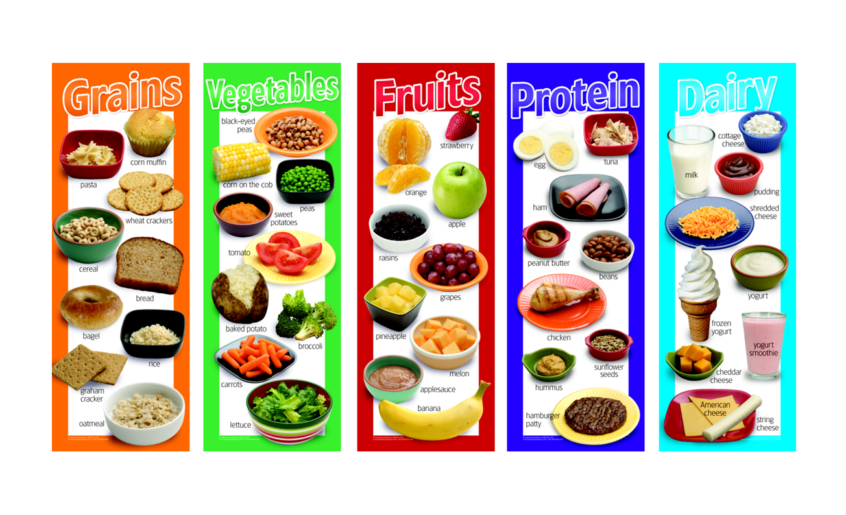WHAT ARE THE FIVE FOOD GROUPS?
1. Grains—Bread, pasta, oatmeal, cereal, and tortillas are all grains.
2. Fruits—Fruits can be fresh, canned, frozen, or dried. Juice that is 100% fruit juice also counts.
3. Vegetables—Vegetables can be raw or cooked, frozen, canned, dried, or 100% vegetable juice.
4. Protein foods—Protein foods include meat, poultry, seafood, beans and peas, eggs, processed soy products, nuts, and seeds.
5. Dairy—Milk and products made from milk, such as cheese, yogurt, and ice cream, make up the dairy group.
ARE OILS AND FATS PART OF HEALTHY EATING?
Although they are not a food group, oils and fats do give you important nutrients. During pregnancy, the fats that you eat provide energy and help build many fetal organs and the placenta. Most of the fats and oils in your diet should come from plant sources. Limit solid fats, such as those from animal sources. Solid fats also can be found in processed foods.
WHY ARE VITAMINS AND MINERALS IMPORTANT IN MY DIET?
Vitamins and minerals play important roles in all of your body functions. During pregnancy, you need more folic acid and iron than a woman who is not pregnant.
HOW CAN I GET THE EXTRA AMOUNTS OF VITAMINS AND MINERALS I NEED DURING PREGNANCY?
Taking a prenatal vitamin supplement can ensure that you are getting these extra amounts. A well-rounded diet should supply all of the other vitamins and minerals you need during pregnancy.
WHAT IS FOLIC ACID AND HOW MUCH DO I NEED DAILY?
Folic acid, also known as folate, is a B vitamin that is important for pregnant women. Before pregnancy and during pregnancy, you need 400 micrograms of folic acid daily to help prevent major birth defects of the baby’s brain and spine called neural tube defects. Current dietary guidelines recommend that pregnany women get at least 600 micrograms of folic acid daily from all sources. It may be hard to get the recommended amount of folic acid from food alone. For this reason, all pregnant women and all women who may become pregnant should take a daily vitamin supplement that contains folic acid.
WHY IS IRON IMPORTANT DURING PREGNANCY AND HOW MUCH DO I NEED DAILY?
Iron is used by your body to make a substance in red blood cells that carries oxygen to your organs and tissues. During pregnancy, you need extra iron—about double the amount that a nonpregnant woman needs. This extra iron helps your body make more blood to supply oxygen to your baby. The daily recommended dose of iron during pregnancy is 27 mg, which is found in most prenatal vitamin supplements. You also can eat iron-rich foods, including lean red meat, poultry, fish, dried beans and peas, iron-fortified cereals, and prune juice. Iron also can be absorbed more easily if iron-rich foods are eaten with vitamin C-rich foods, such as citrus fruits and tomatoes.
WHY IS CALCIUM IMPORTANT DURING PREGNANCY AND HOW MUCH DO I NEED DAILY?
Calcium is used to build your baby’s bones and teeth. All women, including pregnant women, aged 19 years and older should get 1,000 mg of calcium daily; those aged 14–18 years should get 1,300 mg daily. Milk and other dairy products, such as cheese and yogurt, are the best sources of calcium. If you have trouble digesting milk products, you can get calcium from other sources, such as broccoli; dark, leafy greens; sardines; or a calcium supplement.
WHY IS VITAMIN D IMPORTANT DURING PREGNANCY AND HOW MUCH DO I NEED DAILY?
Vitamin D works with calcium to help the baby’s bones and teeth develop. It also is essential for healthy skin and eyesight. All women, including those who are pregnant, need 600 international units of vitamin D a day. Good sources are milk fortified with vitamin D and fatty fish such as salmon. Exposure to sunlight also converts a chemical in the skin to vitamin D.
HOW MUCH WEIGHT SHOULD I GAIN DURING PREGNANCY?
The amount of weight gain that is recommended depends on your health and your body mass index before you were pregnant. If you were a normal weight before pregnancy, you should gain between 25 pounds and 35 pounds during pregnancy. If you were underweight before pregnancy, you should gain more weight than a woman who was a normal weight before pregnancy. If you were overweight or obese before pregnancy, you should gain less weight.
CAN BEING OVERWEIGHT OR OBESE AFFECT MY PREGNANCY?
Overweight and obese women are at an increased risk of several pregnancy problems. These problems include gestational diabetes, high blood pressure, preeclampsia, preterm birth, and cesarean delivery. Babies of overweight and obese mothers also are at greater risk of certain problems, such as birth defects, heavier babies with possible birth injury, and childhood obesity.
WHAT ARE THE BENEFITS OF INCLUDING FISH AND SHELLFISH IN MY DIET DURING PREGNANCY?
Omega-3 fatty acids are a type of fat found naturally in many kinds of fish. They may be important factors in your baby’s brain development both before and after birth. To get the most benefits from omega-3 fatty acids, women should eat at least two servings of fish or shellfish per week and while pregnant or breastfeeding.
How can food poisoning affect my pregnancy?
Food poisoning in a pregnant woman can cause serious problems for both her and her baby. Vomiting and diarrhea can cause your body to lose too much water and can disrupt your body’s chemical balance. To prevent food poisoning, follow these general guidelines:
- Wash food. Rinse all raw produce thoroughly under running tap water before eating, cutting, or cooking.
- Keep your kitchen clean. Wash your hands, knives, counter-tops, and cutting boards after handling and preparing uncooked foods.
- Avoid all raw and under-cooked seafood, eggs, and meat. Do not eat sushi made with raw fish (cooked sushi is safe). Food such as beef, pork, or poultry should be cooked to a safe internal temperature.



